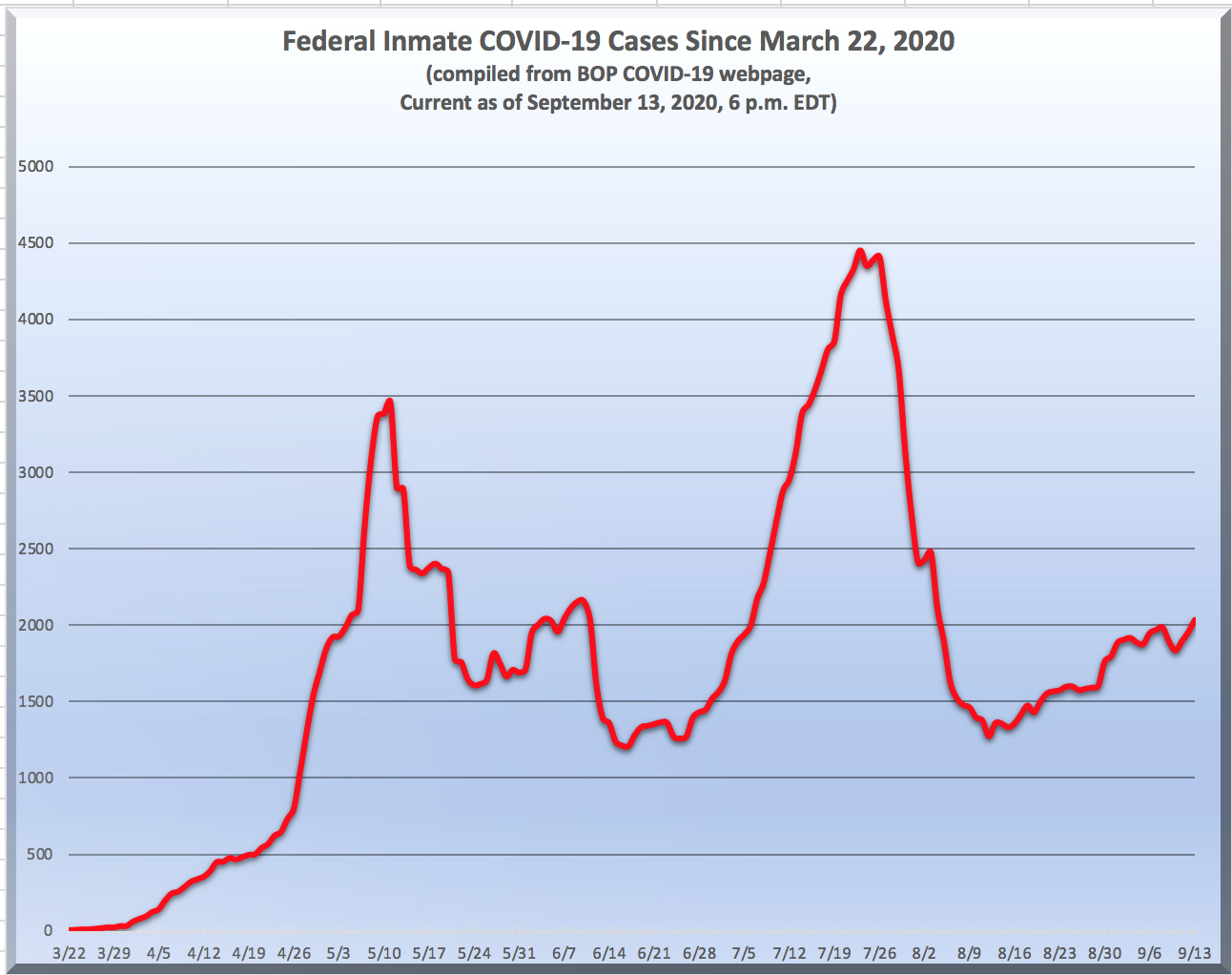We post news and comment on federal criminal justice issues, focused primarily on trial and post-conviction matters, legislative initiatives, and sentencing issues.

COVID-19 GRINDS ON
You’d think, reading enough BOP blandishments about its “Action Plan” to address the COVID-19 pandemic that today, six months after the pandemic began, we’d be doing better. Instead, thehe number of inmates sick with the virus climbed above 2,000 for the fourth time (May 5, June 3, June 7 and July 6), standing last night at 2,033, up 4% from last week’s 1,947. The number of sick staff has fallen 2%, from 643 to 631. The number of facilities with outbreaks has increased by two, from 112 to 114, representing 93% of all institutions (an all-time high).
The BOP has done enough COVID-19 tests as of last night to test 36% of the BOP inmate population, if the BOP were testing each inmate once (which it is definitely not doing). Twenty-five percent of all tests are positive for COVID.
The Sentencing Resources Counsel for the Federal Defenders organization last week issued a blistering review of the BOP’s COVID-19 response, quoting Joe Rojas, a BOP employee and regional vice president of the American Federation of Government Employees Council of Prison Locals. “They’re making the virus explode.” The report identifies 19 BOP inmates “who died in BOP custody after filing —and in some cases, even after being granted—requests for release” and note that “at least four individuals — Adrian Slarzano, Gerald Porter, Robert Hague-Rogers, and Marie Neba — have died of COVID-19 after either testing negative or after BOP erroneously pronounced them ‘recovered’.” It noted the Washington Post’s description of prison response to COVID-19 as exemplifying “a culture of cruelty and disregard for the well-being of incarcerated people,” and described FMC Carswell, a women’s medical facility, as a “house of horror.”
 The report observes that because of the First Step Act of 2018, inmates may file their own motions for compassionate release, but it complains that the 30-day mandatory exhaustion period before filing, “coupled with DOJ’s routine opposition, prevents vulnerable defendants from obtaining critical relief.” Significantly, the Report notes that “based on a survey of defense attorneys representing clients across the country, we are not aware of a single BOP-initiated motion for compassionate release based on heightened risk of severe illness from COVID-19 infection.”
The report observes that because of the First Step Act of 2018, inmates may file their own motions for compassionate release, but it complains that the 30-day mandatory exhaustion period before filing, “coupled with DOJ’s routine opposition, prevents vulnerable defendants from obtaining critical relief.” Significantly, the Report notes that “based on a survey of defense attorneys representing clients across the country, we are not aware of a single BOP-initiated motion for compassionate release based on heightened risk of severe illness from COVID-19 infection.”
Things are unlikely to improve in the coming months. The Institute for Health Metrics and Education (part of the University of Washington), predicts that the daily US death rate, “because of seasonality and declining vigilance of the public, will reach nearly 3,000 a day in December. Cumulative deaths expected by January 1 are 410,000.” Current deaths stand at 197,000. this is 225,000 more deaths from now until the end of the year.
To make matters worse, prisons are bracing for simultaneous outbreaks of the flu and COVID-19 as the weather turns colder. “The flu regularly spreads through prisons and jails in the US for some of the same reasons that COVID-19 does,” the Verge reported last week. “The facilities pack vulnerable people in close quarters, with limited access to soap or other ways to protect themselves against an infectious disease. Handling a single outbreak is already a struggle in these places, which often don’t do enough to protect the health of the people living in them. Now, they may have to handle two.”
 Flu shots are offered to all BOP staff and older and health-compromised inmates, “but those guidelines don’t mean most inmates in the US get flu shots; outbreaks regularly happen in prisons where most inmates aren’t vaccinated.”
Flu shots are offered to all BOP staff and older and health-compromised inmates, “but those guidelines don’t mean most inmates in the US get flu shots; outbreaks regularly happen in prisons where most inmates aren’t vaccinated.”
In the continuing and deadly game of COVID-19 whack-a-mole, the BOP is battling major outbreaks (over 100 cases) at FDC San Diego, Big Spring, USP Leavenworth, Coleman, Petersburg Low and Victorville. Other significant infections are going on at FTC Oklahoma, Waseca, FCI Miami, Forrest City and FDC SeaTac.
A Seattle-area newspaper published a story last week alleging that a BOP CO came to work one day in August with a fever and headache, spreading the virus throughout the facility before his shift ended. The paper said FDC SeaTac violated its own protocols of taking every staff person’s temperature before each shift, thus letting the coronavirus into the facility. As of last night, FDC SeaTac reported 46 sick inmates and seven sick staff.
CoreCivic, the private prison operator that runs facilities holding immigration detainees and thousands of federal prisoners, is getting grilled as well. New Mexico’s congressional delegation wrote to ICE, Marshals and CoreCivic last month about conditions in Cibola County Correctional Institution, a CoreCivic immigration detention prison. CoreCivic took troublingly long to realize that it had “a massive outbreak in its facility endangering the safety of inmates, detainees, staff and the community,” the delegation said, noting that the state Department of Health had to direct CoreCivic to conduct mass testing. The delegation was also concerned that “correctional officers working at the Cibola facility are not wearing adequate [personal protective equipment] when escorting COVID-19 positive inmates into the local hospital.”
Neither any of the agencies nor CoreCivic has responded.
Sentencing Resource Counsel for the Federal Public Community Defenders, The COVID-19 Crisis in Federal Detention (Sept. 9, 2020)
The Verge, Prisons battling COVID-19 face another disease threat this fall (Sept. 11, 2020)
IMHE, Model Updates for Sept. 3, 2020
South Seattle Emerald, SeaTac Federal Detention Center Exposed Prisoners to the Coronavirus by Allegedly Failing to Follow Coronavirus Protocols (Sept. 7, 2020)
Santa Fe New Mexican, Prison’s virus outbreak brings fear to rural area (Sept. 12, 2002)
– Thomas L. Root






